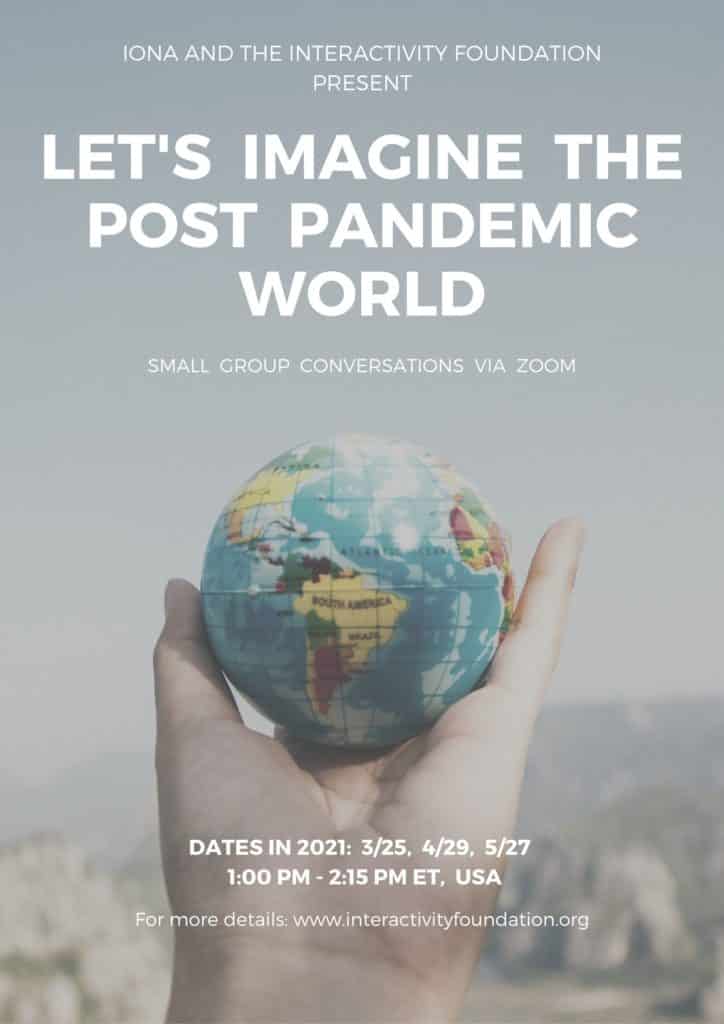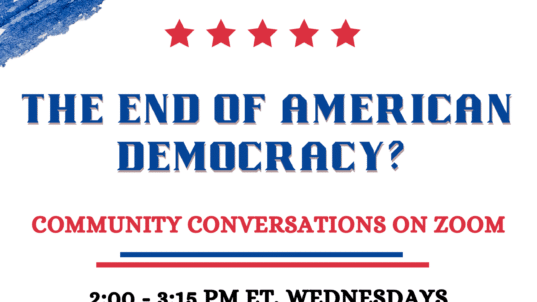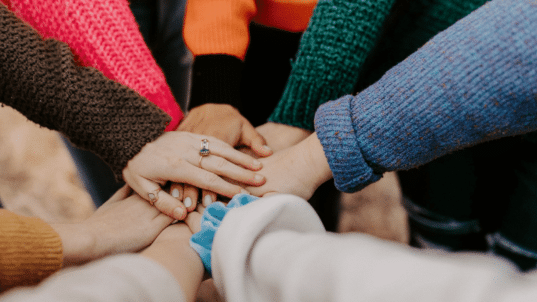 The Interactivity Foundation invites you to join us online on Thursday, May 27th at 1 pm (ET) for the third session of this 3-part series, Let’s Imagine the Post-Pandemic World. In this 3rd session, we will focus on re-imagining work, education, and home life. We hope you can join us. Participation is free, but advance registration is requested. Click on the following button to register for this session.
The Interactivity Foundation invites you to join us online on Thursday, May 27th at 1 pm (ET) for the third session of this 3-part series, Let’s Imagine the Post-Pandemic World. In this 3rd session, we will focus on re-imagining work, education, and home life. We hope you can join us. Participation is free, but advance registration is requested. Click on the following button to register for this session.
In the first conversation on March 25th, participants in three breakout rooms shared what the pandemic has revealed about our society and its communities. The following link will take you to a Discussion Summary for Session One.
Discussion Summary for Session Two on April 29, 2021
In the second conversation on April 29th, participants in three breakout rooms discussed how our cities and transportation have changed—and how the future of our transportation, travel, and cities might look like in the post-pandemic world. Many said that the emotions and trauma from the pandemic need to be taken care of and that we have to start talking about how we can move on. Some observed that people became more concerned about each other and hoped that concern would stay. Others wondered who will be blamed for the terrible mishandling of the pandemic—and how to handle the assessment of blame before such negativity overspills. Others wondered what policies governments will institute to prevent future pandemics and how they will change our daily lives. Finally, many hoped for breakthroughs in transportation and new developments in our urban spaces. Please see below the summary of the main ideas about what a better normal might look like. As with all IF discussions, we were not seeking consensus, but exploration of divergent ideas.
What kind of transportation arrangements would we like to see emerge from the pandemic?
Many participants thought that we will have an opportunity to do things differently and much better when we emerge from the pandemic—and that we should think long-term. They recognized that changes might come to some countries faster than to others.
- Let’s re-imagine the auto industry! The auto industry has been changing substantially since before the pandemic. We should not only repair roads and bridges, but build new and better ones—and do things that might enhance the whole industry, such as renovating the automotive infrastructure and building electrical vehicles, self-driving cars, high-speed trains, and new kinds of air travel. We considered other possibilities:
- There will be less waste of resources, because we can design and prototype more with better software.
- Drones are a part of the future of transportation. Perhaps they will replace some delivery trucks.
- Another big change in the future of transportation is car-sharing and developing a sharing economy in general.
- Environmental policies promote a sharing-economy.
- But that leads to less availability, less autonomy, and less mobility.
- Will the young people think and feel less independent and free?
- Americans love their cars. It is at the core of American identity. Car-sharing will not take root here.
- Delivery transportation patterns are changing. There are more delivery trucks on the roads. During the pandemic, everything, including food, is delivered to us individually via trucks. Deliveries save time, but people do not have interactions that they used to have in shops.
- Let’s re-imagine the public transportation!
- The future of more regional, more distant transportation is unclear as it isn’t obvious yet whether more people will move further outside cities—or different people will move into cities to gain access to services, education, etc.
- People can work and socialize via internet, which reduces mobility.
- We need vastly improved planning for commuter bikeways. We need more of them, but they need to be much better interconnected, to be segregated from vehicle and pedestrian traffic, and to be better regulated.
- DC.’s public transportation did not do a good job during the pandemic. Buses are still too crowded.
- The public transport in America should be more accessible, more user-friendly.
- We need safe mass transit.
- We have to reduce the number or cars for environmental reasons and make driving a less attractive option.
- Let’s re-imagine travel for leisure!
- What is the purpose of travel?
- What is the future of cruises? This industry will shrink—-or might even collapse altogether.
- “I miss traveling a lot. I hope that technologies improve so that we are not destroying the environment as we travel.”
- Leisure will change as well, because you cannot travel far on shared cars. Where will young people look for the feeling of liberty and independence if they don’t have cars?
- Virtual reality is becoming a reality accessible to many. We can live sublimated lives there. E.g., instead of taking Caribbean cruises, we might just use video goggles to experience such travel.
- The less we travel, the less we see, and the less we interact with people who are different. All that creates a closed society that might be manipulated. Ultimately that can lead to nationalism and wars. The less exchange of ideas is happening, the more our societies are closing.
- Some people are exposed to different ideas via internet. The point is to have a choice: to travel when you want to vs. when you have to. Travel for leisure will be up to us.
- In some cultures, there is too much travel, so perhaps some reduction would be good.
What kind of towns and cities would we like to see emerge from the pandemic?
The cityscapes will change in big and small ways. People are more likely to become more local: “It is more comfortable and less time consuming to experience social meetings and church services from home.”
- Let’s have more public meeting spaces, like plazas, parks, restaurants, food courts, etc.
- We want to encourage people to gather outside, so let’s have more parks.
- Shift away from making “hostile spaces” that discourage people from sitting, lying down, resting, and lingering (e.g., large, open, no seating, no separation, no divisions, no shade, etc.) to more friendly, intimate spaces (e.g., broken up by dividers, with landscaping and shade, shelters, and smaller spaces for people to sit and talk, play chess, picnic, etc.)
- What if we create more street space for things like outdoor restaurants? Separate people from the car traffic. It seems that the outdoor cafe-culture is already taking root in D.C.
- Let’s have more pedestrian-friendly public spaces, like the pedestrian zone in Burlington, VT—a nice place to wander, with benches, places to gather, to have entertainment, to walk from shop to shop.
- Create more “playgrounds” for children of all ages.
- Let’s get away from exalting the “egos of the architects” and toward promoting communities of citizens.
- What about shared “private spaces” and spaces with fewer fences?
- Let’s increase variety and affordability of housing
- We could have more co-housing or group housing with separate bedrooms, baths, kitchens, but shared laundry facilities, meeting rooms, commercial kitchens, and recreational/hobby spaces.
- We could have more multi-generational and extended family housing options, like mother-in-law suites.
- We could increase the number of housing for lower-income people.
- We could create more housing as a matter of social justice. Some people have empty second houses, others have no housing at all. We need to have more shared responsibility toward ensuring that everyone has adequate housing. We need housing for the homeless.
- Our healthcare infrastructure and public infrastructure will change in an attempt to prevent future pandemics. The air quality and ventilation has already begun to change in office buildings, schools, and airplanes.
- How will schools change? We need schools to be in-person and full-time, because education prospers best in a social environment. The teachers are burning out with some kids in person, others online. The youngest ones can’t learn as well online.
- How our mindsets might change—or possible social changes
- Foster communities where people express care for each other, where people are kinder.
- Reduce isolation for seniors, single parents, etc.
- Reinvigorate a sense of what neighborliness means—what it means to be a good neighbor; not just sharing a street; but possibly sharing spaces, tools, equipment, time, and helping out.
- Let’s envision a community where there isn’t so much wealth inequality, where there is no more food or housing insecurity, and where there is more sharing, more wealth redistribution.
- Too many unhoused or unfed. People shouldn’t have to be humiliated to get this help.
- A community where there’s housing for all—no tents on the sidewalk for people who lack housing.
- Require that every apartment building have affordable units in it for low-income people.
- Pets in our towns & cities
- Pets need to be trained.
- We should have more “pet-friendly,” but segregated spaces, like dog parks.
- We should improve training, controls, regulations, social habits of pets and pet owners.
- We moved to online spaces; more people are living their lives online.
- The internet is the area that will revolutionize both transportation and the way we live. Many became proficient and comfortable shopping, socializing, and entertaining ourselves online. We need to ensure everyone has internet access in this country and educate people how to use the internet better.
- Privacy concerns: who is gathering all the data about people? And how might it be used/abused? Many services are free online, simply because we, the users, are the product. Do we still have any privacy left? What about the right to be forgotten? What about searching for facts and information—private companies simply care how long you look at something, not how truthful it is. We don’t live in the same realities anymore. Who is manipulating the data that we see? Government will need to create an information infrastructure and find ways to dissuade extremists.
- How much do we trust the government? How much do we trust each other? How much do we trust private companies? How much do we trust the information that we’re getting?
- Let’s imagine more people working from home in the future.
- People may get more done by working from home, fewer distractions.
- What will we miss—if people keep working from home most of the time?
- There are vital social interactions, the cross-fertilization of ideas, that come from people being together physically in the same space.
- But we lose the benefit of serendipity, the chance meetings that spark something new (if you’re working remotely, then everything has to be planned and scheduled, which can be more burdensome than just dropping by).
- We also lose the benefit of meeting different people and learning how to get along with those who are from different backgrounds.
- If we all work from home, what will happen to our communication skills?
- “It’s not enticing to me to think of working from home all the time.”
- What will it be like for the young people starting out their careers?
- Many offices will have to close if more people work from home.
- What if we don’t need as much commercial space? What could we do with the space?
- Use them for moderately priced housing.
- Use them for urban agriculture (indoors) or tear them down for green space.
- People will be sharing offices more.
- Turn commercial spaces into residential spaces.
- If people are going to move to the countryside and work remotely, then we need better broadband across the US to make this possible.



